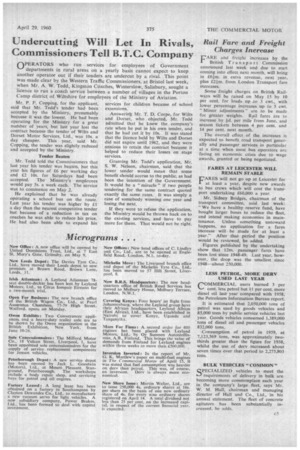FARES AT LEICESTER.WELL REMAIN STABLE
Page 43

If you've noticed an error in this article please click here to report it so we can fix it.
LIAM will not go up at Leicester for at least a year, despite new awards to bus crews which will cost the transport undertaking £60,000 a year.
Mr. Sidney Bridges, chairman of the transport committee, said last week: "We have a healthy reserve fund, have bought larger buses to reduce the fleet, and intend making economies in maintenance. Unless something untoward happens, no application for a fares increase will be made for at least a year." After that period the position would be reviewed, he added.
Figures published by the undertaking show that 12m. passenger fares have been lost since 1948-49. Last year, however, the drop was the smallest since 1948—about 250,000.
LESS PETROL, MORE DERV USED LAST YEAR
rOMMEROAL users burned 3 per cent, less petrol but 11 per cent. more diesel oil last' year compared with 1958, the Petroleum Information Bureau report. It is estimated that 2,050,000 tons of petrol was used by goods vehicles and 85,000 tons by public service vehicles last year. Goods vehicles consumed 1,389,000 tons of diesel oil and passenger vehicles 832,000 tons,
Consumption of petrol in 1959, at 7,123,569 tons, was approximately twothirds greater than the figure for 1938, whilst the use of dery increased about seven times over that period to 2,275,803 tons.
BULK VEHICLES " COMMON " QPECIALIZED vehicles to meet the
requirements of delivery in bulk are becoming more commonplace each year in the company's large fleet, says Mr. W. M. Hall, chairman and managing director of Hall and Co., Ltd., in his annual statement. The fleet of concrete agitators has been substantially increased. he adds.












































































































